高考英语讲练—简单句
图片预览
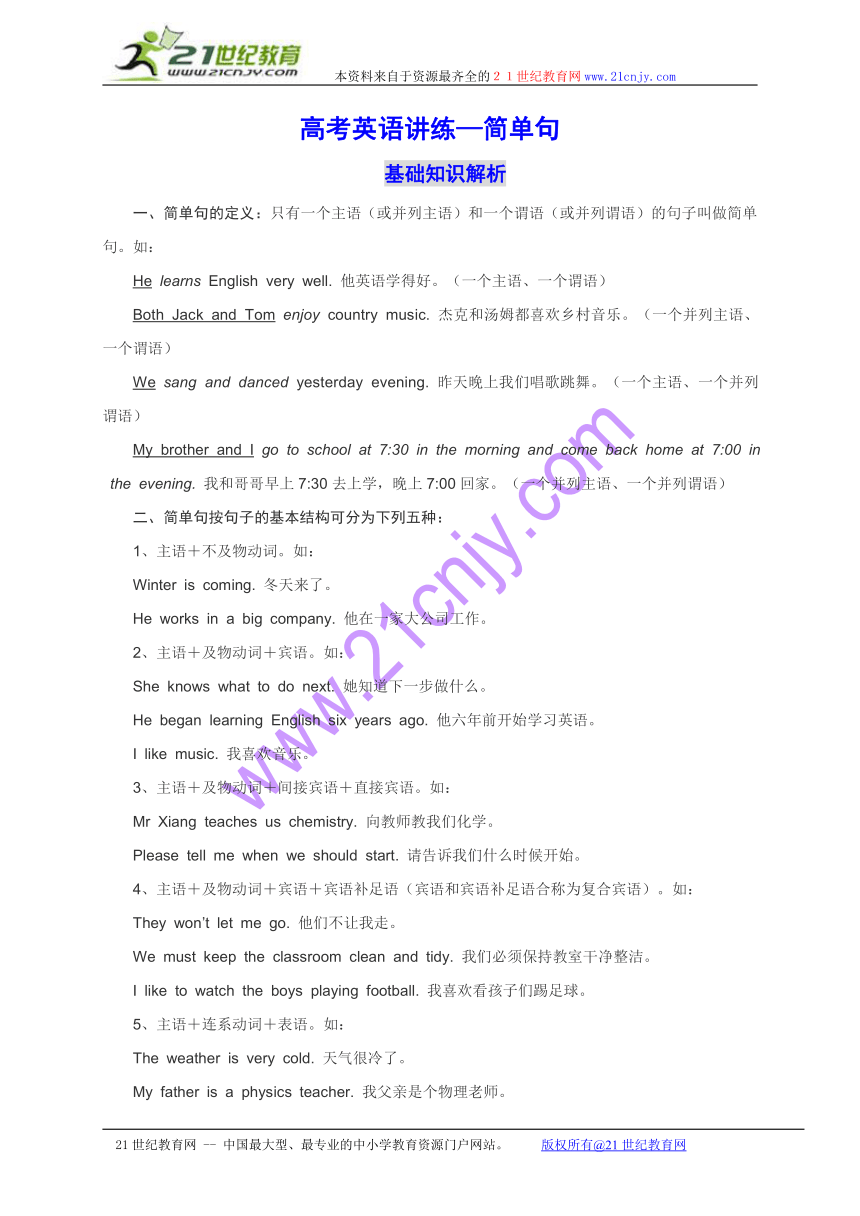
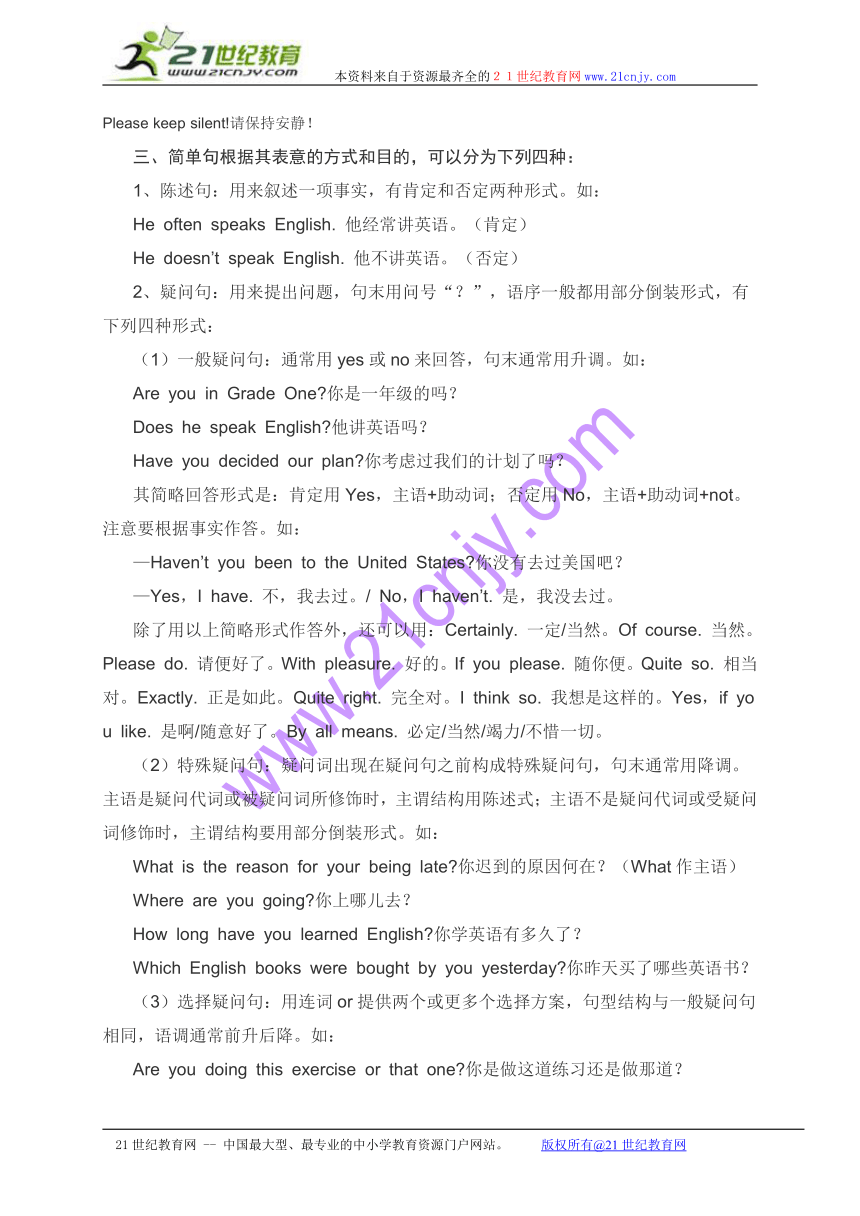
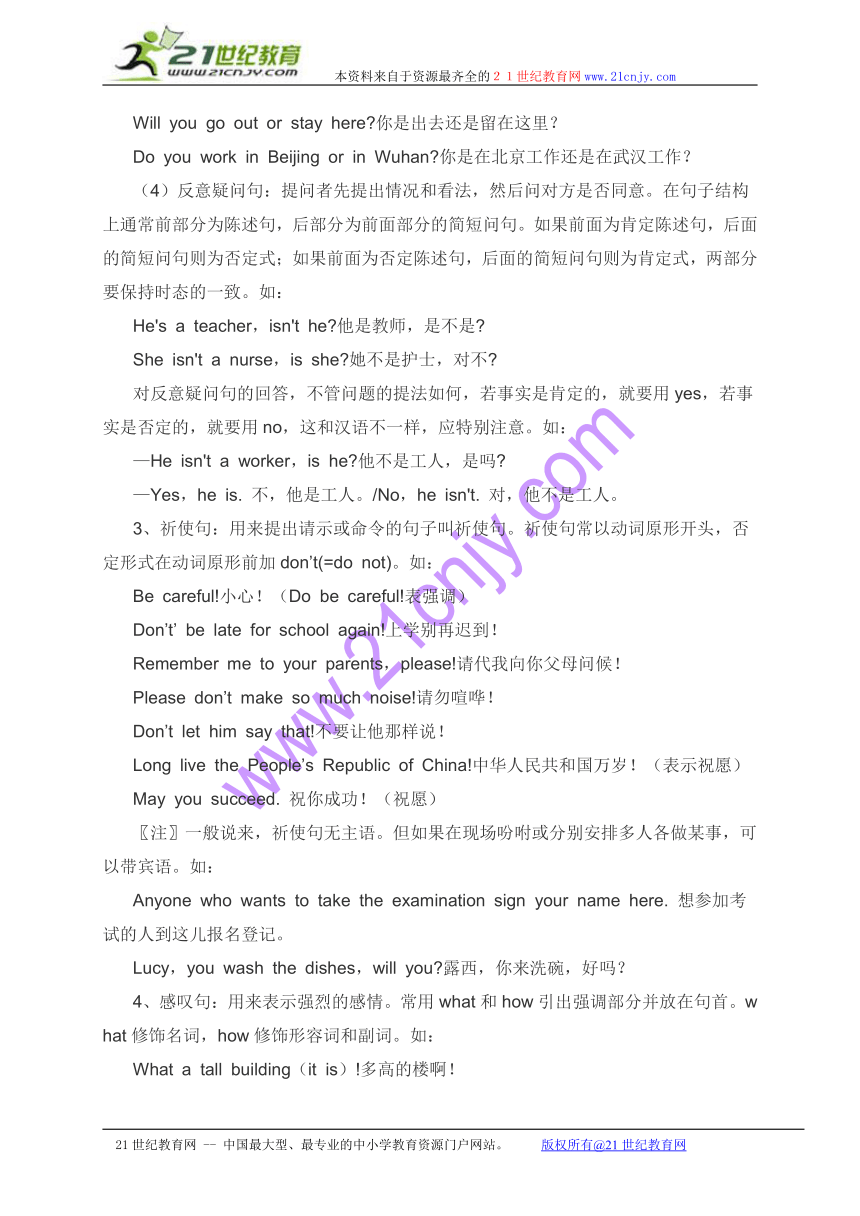
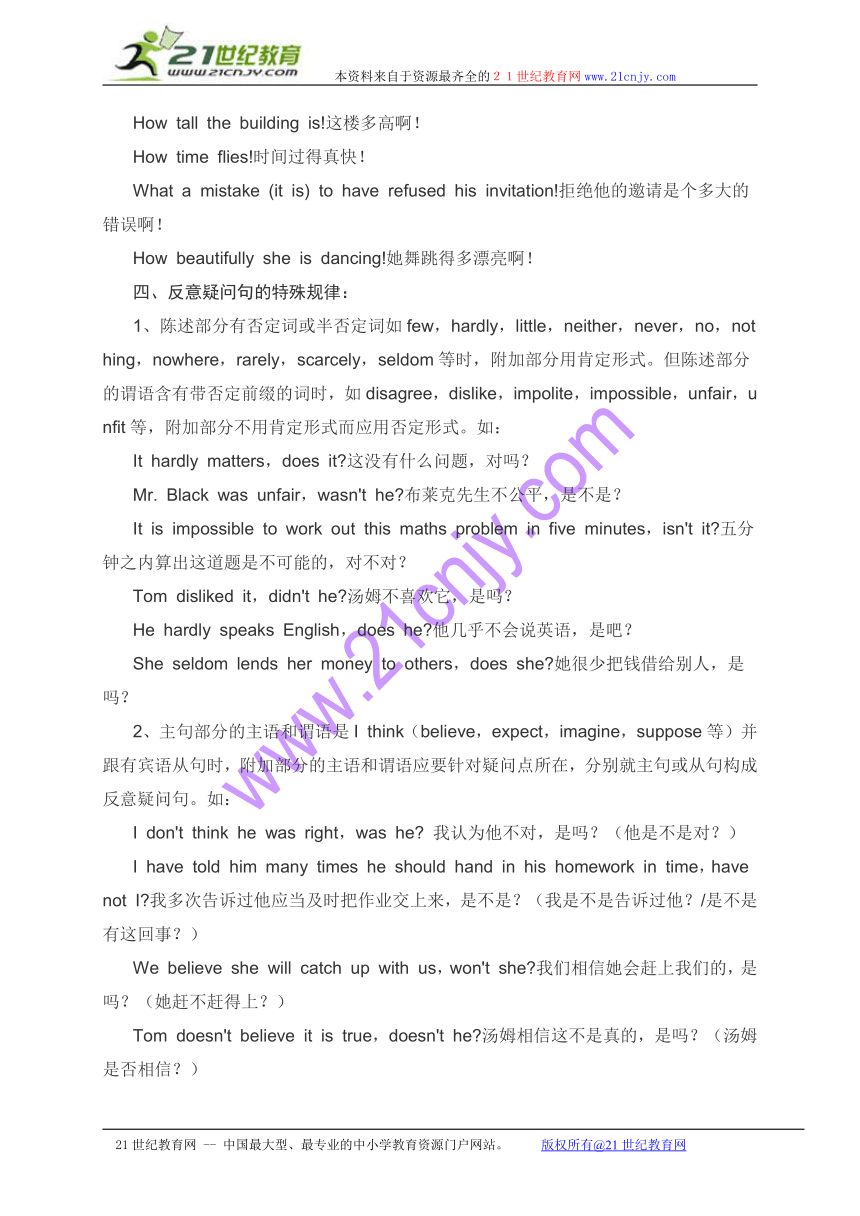
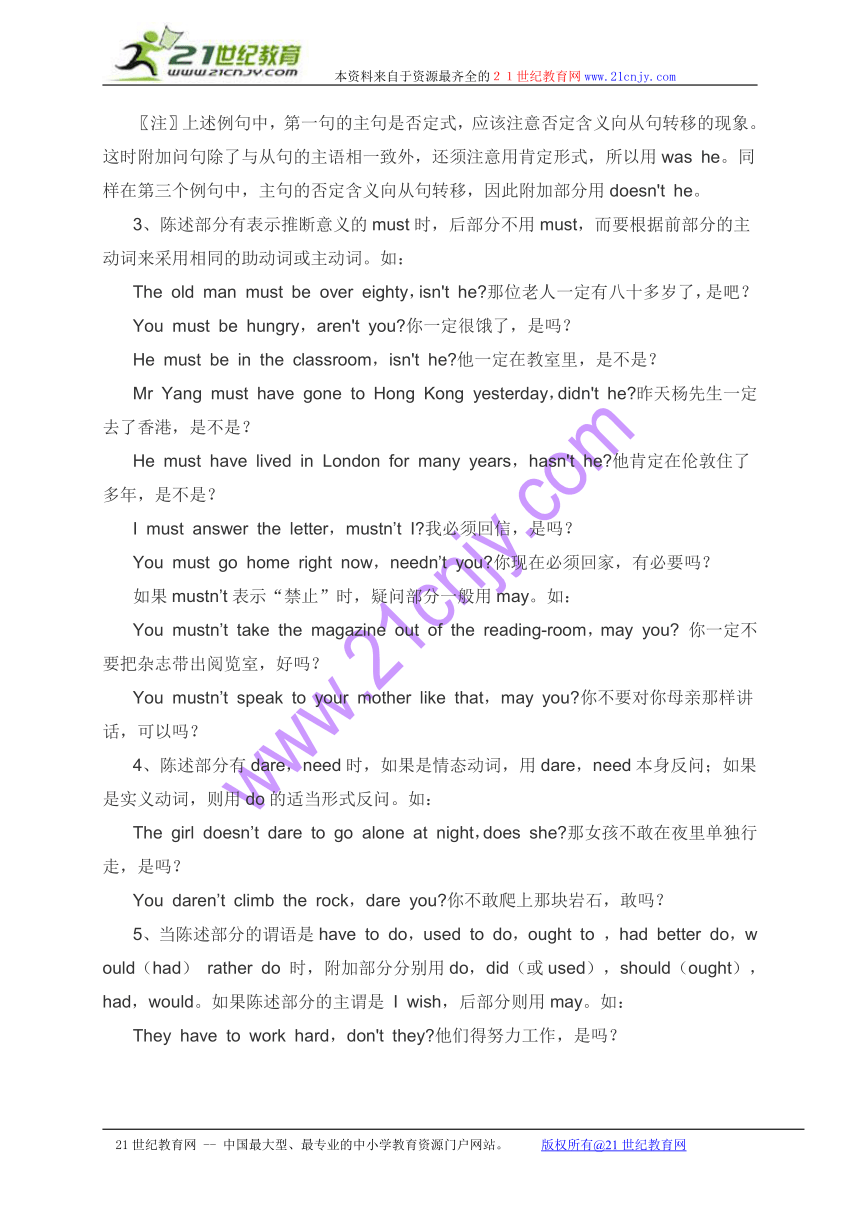
文档简介
本资料来自于资源最齐全的21世纪教育网www.21cnjy.com
高考英语讲练—简单句
基础知识解析
一、简单句的定义:只有一个主语(或并列主语)和一个谓语(或并列谓语)的句子叫做简单句。如:
He learns English very well. 他英语学得好。(一个主语、一个谓语)
Both Jack and Tom enjoy country music. 杰克和汤姆都喜欢乡村音乐。(一个并列主语、一个谓语)
We sang and danced yesterday evening. 昨天晚上我们唱歌跳舞。(一个主语、一个并列谓语)
My brother and I go to school at 7:30 in the morning and come back home at 7:00 in the evening. 我和哥哥早上7:30去上学,晚上7:00回家。(一个并列主语、一个并列谓语)
二、简单句按句子的基本结构可分为下列五种:
1、主语+不及物动词。如:
Winter is coming. 冬天来了。
He works in a big company. 他在一家大公司工作。
2、主语+及物动词+宾语。如:
She knows what to do next. 她知道下一步做什么。
He began learning English six years ago. 他六年前开始学习英语。
I like music. 我喜欢音乐。
3、主语+及物动词+间接宾语+直接宾语。如:
Mr Xiang teaches us chemistry. 向教师教我们化学。
Please tell me when we should start. 请告诉我们什么时候开始。
4、主语+及物动词+宾语+宾语补足语(宾语和宾语补足语合称为复合宾语)。如:
They won’t let me go. 他们不让我走。
We must keep the classroom clean and tidy. 我们必须保持教室干净整洁。
I like to watch the boys playing football. 我喜欢看孩子们踢足球。
5、主语+连系动词+表语。如:
The weather is very cold. 天气很冷了。
My father is a physics teacher. 我父亲是个物理老师。
Please keep silent!请保持安静!
三、简单句根据其表意的方式和目的,可以分为下列四种:
1、陈述句:用来叙述一项事实,有肯定和否定两种形式。如:
He often speaks English. 他经常讲英语。(肯定)
He doesn’t speak English. 他不讲英语。(否定)
2、疑问句:用来提出问题,句末用问号“?”,语序一般都用部分倒装形式,有下列四种形式:
(1)一般疑问句:通常用yes或no来回答,句末通常用升调。如:
Are you in Grade One 你是一年级的吗?
Does he speak English 他讲英语吗?
Have you decided our plan 你考虑过我们的计划了吗?
其简略回答形式是:肯定用Yes,主语+助动词;否定用No,主语+助动词+not。注意要根据事实作答。如:
—Haven’t you been to the United States 你没有去过美国吧?
—Yes,I have. 不,我去过。/ No,I haven’t. 是,我没去过。
除了用以上简略形式作答外,还可以用:Certainly. 一定/当然。Of course. 当然。Please do. 请便好了。With pleasure. 好的。If you please. 随你便。Quite so. 相当对。Exactly. 正是如此。Quite right. 完全对。I think so. 我想是这样的。Yes,if you like. 是啊/随意好了。By all means. 必定/当然/竭力/不惜一切。
(2)特殊疑问句:疑问词出现在疑问句之前构成特殊疑问句,句末通常用降调。主语是疑问代词或被疑问词所修饰时,主谓结构用陈述式;主语不是疑问代词或受疑问词修饰时,主谓结构要用部分倒装形式。如:
What is the reason for your being late 你迟到的原因何在?(What作主语)
Where are you going 你上哪儿去?
How long have you learned English 你学英语有多久了?
Which English books were bought by you yesterday 你昨天买了哪些英语书?
(3)选择疑问句:用连词or提供两个或更多个选择方案,句型结构与一般疑问句相同,语调通常前升后降。如:
Are you doing this exercise or that one 你是做这道练习还是做那道?
Will you go out or stay here 你是出去还是留在这里?
Do you work in Beijing or in Wuhan 你是在北京工作还是在武汉工作?
(4)反意疑问句:提问者先提出情况和看法,然后问对方是否同意。在句子结构上通常前部分为陈述句,后部分为前面部分的简短问句。如果前面为肯定陈述句,后面的简短问句则为否定式;如果前面为否定陈述句,后面的简短问句则为肯定式,两部分要保持时态的一致。如:
He's a teacher,isn't he 他是教师,是不是
She isn't a nurse,is she 她不是护士,对不
对反意疑问句的回答,不管问题的提法如何,若事实是肯定的,就要用yes,若事实是否定的,就要用no,这和汉语不一样,应特别注意。如:
—He isn't a worker,is he 他不是工人,是吗
—Yes,he is. 不,他是工人。/No,he isn't. 对,他不是工人。
3、祈使句:用来提出请示或命令的句子叫祈使句。祈使句常以动词原形开头,否定形式在动词原形前加don’t(=do not)。如:
Be careful!小心!(Do be careful!表强调)
Don’t’ be late for school again!上学别再迟到!
Remember me to your parents,please!请代我向你父母问候!
Please don’t make so much noise!请勿喧哗!
Don’t let him say that!不要让他那样说!
Long live the People’s Republic of China!中华人民共和国万岁!(表示祝愿)
May you succeed. 祝你成功!(祝愿)
〖注〗一般说来,祈使句无主语。但如果在现场吩咐或分别安排多人各做某事,可以带宾语。如:
Anyone who wants to take the examination sign your name here. 想参加考试的人到这儿报名登记。
Lucy,you wash the dishes,will you 露西,你来洗碗,好吗?
4、感叹句:用来表示强烈的感情。常用what和how引出强调部分并放在句首。what修饰名词,how修饰形容词和副词。如:
What a tall building(it is)!多高的楼啊!
How tall the building is!这楼多高啊!
How time flies!时间过得真快!
What a mistake (it is) to have refused his invitation!拒绝他的邀请是个多大的错误啊!
How beautifully she is dancing!她舞跳得多漂亮啊!
四、反意疑问句的特殊规律:
1、陈述部分有否定词或半否定词如few,hardly,little,neither,never,no,nothing,nowhere,rarely,scarcely,seldom等时,附加部分用肯定形式。但陈述部分的谓语含有带否定前缀的词时,如disagree,dislike,impolite,impossible,unfair,unfit等,附加部分不用肯定形式而应用否定形式。如:
It hardly matters,does it 这没有什么问题,对吗?
Mr. Black was unfair,wasn't he 布莱克先生不公平,是不是?
It is impossible to work out this maths problem in five minutes,isn't it 五分钟之内算出这道题是不可能的,对不对?
Tom disliked it,didn't he 汤姆不喜欢它,是吗?
He hardly speaks English,does he 他几乎不会说英语,是吧?
She seldom lends her money to others,does she 她很少把钱借给别人,是吗?
2、主句部分的主语和谓语是I think(believe,expect,imagine,suppose等)并跟有宾语从句时,附加部分的主语和谓语应要针对疑问点所在,分别就主句或从句构成反意疑问句。如:
I don't think he was right,was he 我认为他不对,是吗?(他是不是对?)
I have told him many times he should hand in his homework in time,have not I 我多次告诉过他应当及时把作业交上来,是不是?(我是不是告诉过他?/是不是有这回事?)
We believe she will catch up with us,won't she 我们相信她会赶上我们的,是吗?(她赶不赶得上?)
Tom doesn't believe it is true,doesn't he 汤姆相信这不是真的,是吗?(汤姆是否相信?)
〖注〗上述例句中,第一句的主句是否定式,应该注意否定含义向从句转移的现象。这时附加问句除了与从句的主语相一致外,还须注意用肯定形式,所以用was he。同样在第三个例句中,主句的否定含义向从句转移,因此附加部分用doesn't he。
3、陈述部分有表示推断意义的must时,后部分不用must,而要根据前部分的主动词来采用相同的助动词或主动词。如:
The old man must be over eighty,isn't he 那位老人一定有八十多岁了,是吧?
You must be hungry,aren't you 你一定很饿了,是吗?
He must be in the classroom,isn't he 他一定在教室里,是不是?
Mr Yang must have gone to Hong Kong yesterday,didn't he 昨天杨先生一定去了香港,是不是?
He must have lived in London for many years,hasn't he 他肯定在伦敦住了多年,是不是?
I must answer the letter,mustn’t I 我必须回信,是吗?
You must go home right now,needn’t you 你现在必须回家,有必要吗?
如果mustn’t表示“禁止”时,疑问部分一般用may。如:
You mustn’t take the magazine out of the reading-room,may you 你一定不要把杂志带出阅览室,好吗?
You mustn’t speak to your mother like that,may you 你不要对你母亲那样讲话,可以吗?
4、陈述部分有dare,need时,如果是情态动词,用dare,need本身反问;如果是实义动词,则用do的适当形式反问。如:
The girl doesn’t dare to go alone at night,does she 那女孩不敢在夜里单独行走,是吗?
You daren’t climb the rock,dare you 你不敢爬上那块岩石,敢吗?
5、当陈述部分的谓语是have to do,used to do,ought to ,had better do,would(had) rather do 时,附加部分分别用do,did(或used),should(ought),had,would。如果陈述部分的主谓是 I wish,后部分则用may。如:
They have to work hard,don't they 他们得努力工作,是吗?
She used to work in a factory,didn't(或used not)she 她过去在一家工厂工作,对不对?
They ought to go there by water,shouldn't(oughtn't)they 他们应当走水路去那儿,对不?
You'd better ask the doctor,hadn't you 你最好问一问医生,可否?
You would(had)rather ask him,wouldn't you 你更应当去问问他,是不是?
I wish to go home now,may I 我希望现在回家去,可以吗?
6、以祈使句开头的反意问句,附加部分用will you 或won't you。但will you 表示请求或建议,won't you表示提醒。如果陈述部分用Let’s开头,附加部分用shall we来反问;若以Let us开头,用will you。如:
Let me sit here with you,will you 让我和你一起坐在这儿,可以吗?
Go to bed early,won't you 早点去睡觉,好吧?
Let's sing in English,shall we 咱们用英语唱吧,行不?
Be sure to write to us,will you/won’t you 一定要给我们写信,好吗?
但陈述部分为否定祈使句时,疑问部分只能用will you。如:
Don’t smoke in the bedroom,will you 不要在卧室里抽烟,好吗?
祈使句带有主语时:You take your coffee back,right 你把咖啡带回去,好不好?
7、如果陈述部分的主语为nobody,somebody,no one,someone,none,anyone,anybody,everyone等不定代词,反意疑问部分主语用they或he。如:
Somebody took my umbrella away yesterday,didn’t they/he 昨天有人拿走了我的雨伞,是吗?
Somebody borrowed my pen yesterday,didn't they/he 昨天有人借走了我的钢笔,是吗?
8、陈述部分的主语为nothing,anything,everything等不定代词时,反意疑问部分主语用it。如:
Nothing could prevent him from going there,could it 什么也不能阻止他去那里,对吗?
Nothing can stop us from smoking,can it 什么也不能阻止我们抽烟,是吗?
9、陈述部分主语是不定式、动名词、从句、this/that,疑问部分用it。如:
Smoking is harmful to health,isn't it 抽烟对健康有害,是吗?
What he said at the meeting is very important,isn’t it 他在会上讲的很重要,对吗?
To master a foreign language isn’t easy,is it 掌握一门外语不容易,是吗?
10、当陈述部分是由I’m sure that; I’m afraid that; We are sure that; We are afraid that; I feel sure that; We feel sure that构成时,反意疑问句与主要信息的宾语从句一致。如:
I’m afraid that he is afraid of being punished,isn’t he 恐怕他怕受到惩罚,是吗?
11、陈述部分是感叹句是,一律用be的否定形式反问。如:
What a lovely day,isn't it 多好的天气啊,不是吗?
What a lovely boy he is,isn’t he 多么聪明的一个男孩啊,不是吗?
How hard she works,isn’t she 她工作多努力啊,不是吗?
12、陈述部分中的have表示“有”的意义时,可用don’t或haven’t反问,作其他意义解时用do来反问。如:
He often has colds,doesn't he 他经常患感冒,不是吗?
13、以There be 开头,用there be反问。如:
There were many people in the room then,were there 那时房间里有很多人,是吗?
14、其它形式:
Neither you nor I am a teacher,are we (合并主语)
I am late,aren't I (I am的反意疑问式)
You'd like some coffee,wouldn't you (would like…)
I want to have a talk with you,may I/OK (表示愿望)
能力过关检测
1. —____ Tricia was in such a hurry
—I don’t know. She might have been running to catch the bus.
A. Why do you think B. Why you think
C. Do you think why D. Why not think
2. ____,and the problem would be straightened out.
A. A bit more effort B. Having a little effort
C. If you have a bit more effort D. There being a little effort
3. Professor Babbage gave us a wonderful lecture yesterday. ____important information he gave us!
A. What an B. How C. How an D. What
4. —You know it’s Emily’s birthday on Friday,____
—Actually I forgot. Thanks for reminding me. I’ll buy her a present this afternoon.
A. don’t you B. do you C. isn’t itD. is it
5. Do tell me what you’d like for your birthday,dear,____
A. will you B. do you C. couldn’t you D. don’t you
6. Peter,____ the window quickly. ____ the wind blows!
A. will shut; What B. is shutting; How C. shuts; What D. shut; How
7. Everybody wants to see the picture,____
A. don’t they B. do they C. didn’t he D. does he
8. ____ food you’ve cooked!
A. How a nice B. What a nice C. How nice D. What nice
9. ____ your coat at once. We must hurry.
A. Wear B. Wearing C. Put onD. Putting on
10. There is someone at the door,____
A. isn’t there B. is there C. isn’t he D. is it
11. She hardly ever speaks to you in English,____
A. does she B. doesn’t she C. can she D. can’t she
12. I don’t think she cares,____
A. does she B. do I C. don’t I D. doesn’t she
13. You had a good rest after work,____
A. hadn’t you B. didn’t you C. had you D. did you
14. You must have read about Dickens long ago,____
A. mustn’t you B. haven’t you C. can’t you D. didn’t you
15. Mary said she wasn’t feeling well yesterday,____
A. didn’t she B. was she C. wasn’t she D. did she
16. What beautiful weather,____
A. isn’t itB. is it C. wasn’t it D. doesn’t it
17. She paid more than she should have paid for the oranges,____
A. shouldn’t she B. should she C. didn’t she D. hadn’t she
18. Alice daren’t do it,____
A. is she B. dare she C. dares she D. will she
19. Let’s do it together,____
A. shall we B. will we C. need we D. will she
20. Jane used to live in London,____
A. use not she B. used she C. didn’t she D. did she
21. You’d rather be there early,____?
A. hadn’t you B. shouldn’t you C. wouldn’t you D. didn’t you
22. Everything seems all right,____
A. doesn’t it B. won’t it C. hasn’t it D. don’t they
23. You’d like some coffee,____
A. hadn’t you B. had you C. wouldn’t you D. would you
24. Let me do it,____
A. shall we B. shan’t we C. will you D. won’t you
25. We never dared to ask him questions,____
A. did we B. daredn’t we C. dared we D. didn’t we
26. You’d better come tomorrow,____
A. didn’t you B. couldn’t you C. wouldn’t you D. hadn’t you
27. Everyone hopes to succeed in life,____
A. doesn’t he B. didn’t they C. hadn’t he D. haven’t they
28. Everything is in order,____
A. doesn’t it B. don’t they C. isn’t itD. aren’t they
29. He had little time to spare,____
A. had heB. hadn’t heC. did heD. didn’t he
30. I told you that he couldn’t play the piano,____
A. didn’t I B. did I C. couldn’t I D. could I
31. —What’s the problem
—The meeting isn’t over yet,but we can leave now,____
A. can we B. we can’t C. can’t we D. won’t we
32. This is the third time he has been late,____
A. isn’t itB. hasn’t heC. isn’t he D. hasn’t it
33. —Did you finish your work
—No,I won’t be able to; ____ you
A. were B. don’t you C. are D. have
34. Today’s weather isn’t as cold as it was yesterday,____
A. was itB. wasn’t it C. isn’t itD. is it
35. When the teacher speaks,we have to keep quiet,____
A. shan’t we B. won’t we C. don’t we D. haven’t we
36. I wish to go home now,____
A. may I B. have I C. do I D. can’t I
37. They should have finished it already,____
A. shouldn’t they B. haven’t they C. have they D. should they
38. You and I did it together,____
A. didn’t you B. didn’t I C. didn’t we D. did you
39. Peter ought to have done it in the first place,____
A. hadn’t he B. didn’t he C. oughtn’t he D. ought he
40. Go and get me some chalk,____
A. can’t you B. shan’t you C. won’t you D. don’t you
41. Jane said no one was fond of the job,____
A. did she B. didn’t she C. was he D. wasn’t he
42. He had little idea that it was getting so late,____
A. didn’t he B. wasn’t it C. did heD. was it
43. —You know it’s Emily’s birthday,____
—Actually I ____. Thanks for reminding me. I’ll buy her a present this afternoon.
A. don’t you,forgot B. do you; forget
C. isn’t it; have forgotten D. is it; forgot
44. I don’t think he could have done such a stupid thing last night,____
A. do I B. could heC. did he D. has he
45. What a long time we’ve been waiting,____
A. don’t we B. aren’t weC. isn’t it D. doesn’t it
46. —I telephoned him twice and I couldn’t get through to his home.
—I think that the line might have been out of order,____
A. don’t you B. do you C. wasn’t it D. hadn’t it
47. —I don’t suppose he could have done well in the mid-term exam last week,____ he
—____,he almost failed to pass the exam.
A. had; Yes B. did; No C. couldn’t; Yes D. has; No
48. You had one of your teeth pulled out yesterday,____
A. hadn’t B. had you C. didn’t you D. did you
49. If you want help-money or anything,let me know,____ you
A. don’t B. will C. shall D. do
50. —Frank is up late working again.
—This is the third time this week he’s had to study late,____
A. isn’t he B. isn’t it C. hasn’t he D. hasn’t it
51. We must study English hard,or we are not good at English,____
A. mustn’t we B. aren’t weC. are we D. must we
Key: AADAA DADCA AABDA ACBAC CACCA DACCA
CACDC AACCC BCACC CBCBB C
21世纪教育网 -- 中国最大型、最专业的中小学教育资源门户网站。 版权所有@21世纪教育网
高考英语讲练—简单句
基础知识解析
一、简单句的定义:只有一个主语(或并列主语)和一个谓语(或并列谓语)的句子叫做简单句。如:
He learns English very well. 他英语学得好。(一个主语、一个谓语)
Both Jack and Tom enjoy country music. 杰克和汤姆都喜欢乡村音乐。(一个并列主语、一个谓语)
We sang and danced yesterday evening. 昨天晚上我们唱歌跳舞。(一个主语、一个并列谓语)
My brother and I go to school at 7:30 in the morning and come back home at 7:00 in the evening. 我和哥哥早上7:30去上学,晚上7:00回家。(一个并列主语、一个并列谓语)
二、简单句按句子的基本结构可分为下列五种:
1、主语+不及物动词。如:
Winter is coming. 冬天来了。
He works in a big company. 他在一家大公司工作。
2、主语+及物动词+宾语。如:
She knows what to do next. 她知道下一步做什么。
He began learning English six years ago. 他六年前开始学习英语。
I like music. 我喜欢音乐。
3、主语+及物动词+间接宾语+直接宾语。如:
Mr Xiang teaches us chemistry. 向教师教我们化学。
Please tell me when we should start. 请告诉我们什么时候开始。
4、主语+及物动词+宾语+宾语补足语(宾语和宾语补足语合称为复合宾语)。如:
They won’t let me go. 他们不让我走。
We must keep the classroom clean and tidy. 我们必须保持教室干净整洁。
I like to watch the boys playing football. 我喜欢看孩子们踢足球。
5、主语+连系动词+表语。如:
The weather is very cold. 天气很冷了。
My father is a physics teacher. 我父亲是个物理老师。
Please keep silent!请保持安静!
三、简单句根据其表意的方式和目的,可以分为下列四种:
1、陈述句:用来叙述一项事实,有肯定和否定两种形式。如:
He often speaks English. 他经常讲英语。(肯定)
He doesn’t speak English. 他不讲英语。(否定)
2、疑问句:用来提出问题,句末用问号“?”,语序一般都用部分倒装形式,有下列四种形式:
(1)一般疑问句:通常用yes或no来回答,句末通常用升调。如:
Are you in Grade One 你是一年级的吗?
Does he speak English 他讲英语吗?
Have you decided our plan 你考虑过我们的计划了吗?
其简略回答形式是:肯定用Yes,主语+助动词;否定用No,主语+助动词+not。注意要根据事实作答。如:
—Haven’t you been to the United States 你没有去过美国吧?
—Yes,I have. 不,我去过。/ No,I haven’t. 是,我没去过。
除了用以上简略形式作答外,还可以用:Certainly. 一定/当然。Of course. 当然。Please do. 请便好了。With pleasure. 好的。If you please. 随你便。Quite so. 相当对。Exactly. 正是如此。Quite right. 完全对。I think so. 我想是这样的。Yes,if you like. 是啊/随意好了。By all means. 必定/当然/竭力/不惜一切。
(2)特殊疑问句:疑问词出现在疑问句之前构成特殊疑问句,句末通常用降调。主语是疑问代词或被疑问词所修饰时,主谓结构用陈述式;主语不是疑问代词或受疑问词修饰时,主谓结构要用部分倒装形式。如:
What is the reason for your being late 你迟到的原因何在?(What作主语)
Where are you going 你上哪儿去?
How long have you learned English 你学英语有多久了?
Which English books were bought by you yesterday 你昨天买了哪些英语书?
(3)选择疑问句:用连词or提供两个或更多个选择方案,句型结构与一般疑问句相同,语调通常前升后降。如:
Are you doing this exercise or that one 你是做这道练习还是做那道?
Will you go out or stay here 你是出去还是留在这里?
Do you work in Beijing or in Wuhan 你是在北京工作还是在武汉工作?
(4)反意疑问句:提问者先提出情况和看法,然后问对方是否同意。在句子结构上通常前部分为陈述句,后部分为前面部分的简短问句。如果前面为肯定陈述句,后面的简短问句则为否定式;如果前面为否定陈述句,后面的简短问句则为肯定式,两部分要保持时态的一致。如:
He's a teacher,isn't he 他是教师,是不是
She isn't a nurse,is she 她不是护士,对不
对反意疑问句的回答,不管问题的提法如何,若事实是肯定的,就要用yes,若事实是否定的,就要用no,这和汉语不一样,应特别注意。如:
—He isn't a worker,is he 他不是工人,是吗
—Yes,he is. 不,他是工人。/No,he isn't. 对,他不是工人。
3、祈使句:用来提出请示或命令的句子叫祈使句。祈使句常以动词原形开头,否定形式在动词原形前加don’t(=do not)。如:
Be careful!小心!(Do be careful!表强调)
Don’t’ be late for school again!上学别再迟到!
Remember me to your parents,please!请代我向你父母问候!
Please don’t make so much noise!请勿喧哗!
Don’t let him say that!不要让他那样说!
Long live the People’s Republic of China!中华人民共和国万岁!(表示祝愿)
May you succeed. 祝你成功!(祝愿)
〖注〗一般说来,祈使句无主语。但如果在现场吩咐或分别安排多人各做某事,可以带宾语。如:
Anyone who wants to take the examination sign your name here. 想参加考试的人到这儿报名登记。
Lucy,you wash the dishes,will you 露西,你来洗碗,好吗?
4、感叹句:用来表示强烈的感情。常用what和how引出强调部分并放在句首。what修饰名词,how修饰形容词和副词。如:
What a tall building(it is)!多高的楼啊!
How tall the building is!这楼多高啊!
How time flies!时间过得真快!
What a mistake (it is) to have refused his invitation!拒绝他的邀请是个多大的错误啊!
How beautifully she is dancing!她舞跳得多漂亮啊!
四、反意疑问句的特殊规律:
1、陈述部分有否定词或半否定词如few,hardly,little,neither,never,no,nothing,nowhere,rarely,scarcely,seldom等时,附加部分用肯定形式。但陈述部分的谓语含有带否定前缀的词时,如disagree,dislike,impolite,impossible,unfair,unfit等,附加部分不用肯定形式而应用否定形式。如:
It hardly matters,does it 这没有什么问题,对吗?
Mr. Black was unfair,wasn't he 布莱克先生不公平,是不是?
It is impossible to work out this maths problem in five minutes,isn't it 五分钟之内算出这道题是不可能的,对不对?
Tom disliked it,didn't he 汤姆不喜欢它,是吗?
He hardly speaks English,does he 他几乎不会说英语,是吧?
She seldom lends her money to others,does she 她很少把钱借给别人,是吗?
2、主句部分的主语和谓语是I think(believe,expect,imagine,suppose等)并跟有宾语从句时,附加部分的主语和谓语应要针对疑问点所在,分别就主句或从句构成反意疑问句。如:
I don't think he was right,was he 我认为他不对,是吗?(他是不是对?)
I have told him many times he should hand in his homework in time,have not I 我多次告诉过他应当及时把作业交上来,是不是?(我是不是告诉过他?/是不是有这回事?)
We believe she will catch up with us,won't she 我们相信她会赶上我们的,是吗?(她赶不赶得上?)
Tom doesn't believe it is true,doesn't he 汤姆相信这不是真的,是吗?(汤姆是否相信?)
〖注〗上述例句中,第一句的主句是否定式,应该注意否定含义向从句转移的现象。这时附加问句除了与从句的主语相一致外,还须注意用肯定形式,所以用was he。同样在第三个例句中,主句的否定含义向从句转移,因此附加部分用doesn't he。
3、陈述部分有表示推断意义的must时,后部分不用must,而要根据前部分的主动词来采用相同的助动词或主动词。如:
The old man must be over eighty,isn't he 那位老人一定有八十多岁了,是吧?
You must be hungry,aren't you 你一定很饿了,是吗?
He must be in the classroom,isn't he 他一定在教室里,是不是?
Mr Yang must have gone to Hong Kong yesterday,didn't he 昨天杨先生一定去了香港,是不是?
He must have lived in London for many years,hasn't he 他肯定在伦敦住了多年,是不是?
I must answer the letter,mustn’t I 我必须回信,是吗?
You must go home right now,needn’t you 你现在必须回家,有必要吗?
如果mustn’t表示“禁止”时,疑问部分一般用may。如:
You mustn’t take the magazine out of the reading-room,may you 你一定不要把杂志带出阅览室,好吗?
You mustn’t speak to your mother like that,may you 你不要对你母亲那样讲话,可以吗?
4、陈述部分有dare,need时,如果是情态动词,用dare,need本身反问;如果是实义动词,则用do的适当形式反问。如:
The girl doesn’t dare to go alone at night,does she 那女孩不敢在夜里单独行走,是吗?
You daren’t climb the rock,dare you 你不敢爬上那块岩石,敢吗?
5、当陈述部分的谓语是have to do,used to do,ought to ,had better do,would(had) rather do 时,附加部分分别用do,did(或used),should(ought),had,would。如果陈述部分的主谓是 I wish,后部分则用may。如:
They have to work hard,don't they 他们得努力工作,是吗?
She used to work in a factory,didn't(或used not)she 她过去在一家工厂工作,对不对?
They ought to go there by water,shouldn't(oughtn't)they 他们应当走水路去那儿,对不?
You'd better ask the doctor,hadn't you 你最好问一问医生,可否?
You would(had)rather ask him,wouldn't you 你更应当去问问他,是不是?
I wish to go home now,may I 我希望现在回家去,可以吗?
6、以祈使句开头的反意问句,附加部分用will you 或won't you。但will you 表示请求或建议,won't you表示提醒。如果陈述部分用Let’s开头,附加部分用shall we来反问;若以Let us开头,用will you。如:
Let me sit here with you,will you 让我和你一起坐在这儿,可以吗?
Go to bed early,won't you 早点去睡觉,好吧?
Let's sing in English,shall we 咱们用英语唱吧,行不?
Be sure to write to us,will you/won’t you 一定要给我们写信,好吗?
但陈述部分为否定祈使句时,疑问部分只能用will you。如:
Don’t smoke in the bedroom,will you 不要在卧室里抽烟,好吗?
祈使句带有主语时:You take your coffee back,right 你把咖啡带回去,好不好?
7、如果陈述部分的主语为nobody,somebody,no one,someone,none,anyone,anybody,everyone等不定代词,反意疑问部分主语用they或he。如:
Somebody took my umbrella away yesterday,didn’t they/he 昨天有人拿走了我的雨伞,是吗?
Somebody borrowed my pen yesterday,didn't they/he 昨天有人借走了我的钢笔,是吗?
8、陈述部分的主语为nothing,anything,everything等不定代词时,反意疑问部分主语用it。如:
Nothing could prevent him from going there,could it 什么也不能阻止他去那里,对吗?
Nothing can stop us from smoking,can it 什么也不能阻止我们抽烟,是吗?
9、陈述部分主语是不定式、动名词、从句、this/that,疑问部分用it。如:
Smoking is harmful to health,isn't it 抽烟对健康有害,是吗?
What he said at the meeting is very important,isn’t it 他在会上讲的很重要,对吗?
To master a foreign language isn’t easy,is it 掌握一门外语不容易,是吗?
10、当陈述部分是由I’m sure that; I’m afraid that; We are sure that; We are afraid that; I feel sure that; We feel sure that构成时,反意疑问句与主要信息的宾语从句一致。如:
I’m afraid that he is afraid of being punished,isn’t he 恐怕他怕受到惩罚,是吗?
11、陈述部分是感叹句是,一律用be的否定形式反问。如:
What a lovely day,isn't it 多好的天气啊,不是吗?
What a lovely boy he is,isn’t he 多么聪明的一个男孩啊,不是吗?
How hard she works,isn’t she 她工作多努力啊,不是吗?
12、陈述部分中的have表示“有”的意义时,可用don’t或haven’t反问,作其他意义解时用do来反问。如:
He often has colds,doesn't he 他经常患感冒,不是吗?
13、以There be 开头,用there be反问。如:
There were many people in the room then,were there 那时房间里有很多人,是吗?
14、其它形式:
Neither you nor I am a teacher,are we (合并主语)
I am late,aren't I (I am的反意疑问式)
You'd like some coffee,wouldn't you (would like…)
I want to have a talk with you,may I/OK (表示愿望)
能力过关检测
1. —____ Tricia was in such a hurry
—I don’t know. She might have been running to catch the bus.
A. Why do you think B. Why you think
C. Do you think why D. Why not think
2. ____,and the problem would be straightened out.
A. A bit more effort B. Having a little effort
C. If you have a bit more effort D. There being a little effort
3. Professor Babbage gave us a wonderful lecture yesterday. ____important information he gave us!
A. What an B. How C. How an D. What
4. —You know it’s Emily’s birthday on Friday,____
—Actually I forgot. Thanks for reminding me. I’ll buy her a present this afternoon.
A. don’t you B. do you C. isn’t itD. is it
5. Do tell me what you’d like for your birthday,dear,____
A. will you B. do you C. couldn’t you D. don’t you
6. Peter,____ the window quickly. ____ the wind blows!
A. will shut; What B. is shutting; How C. shuts; What D. shut; How
7. Everybody wants to see the picture,____
A. don’t they B. do they C. didn’t he D. does he
8. ____ food you’ve cooked!
A. How a nice B. What a nice C. How nice D. What nice
9. ____ your coat at once. We must hurry.
A. Wear B. Wearing C. Put onD. Putting on
10. There is someone at the door,____
A. isn’t there B. is there C. isn’t he D. is it
11. She hardly ever speaks to you in English,____
A. does she B. doesn’t she C. can she D. can’t she
12. I don’t think she cares,____
A. does she B. do I C. don’t I D. doesn’t she
13. You had a good rest after work,____
A. hadn’t you B. didn’t you C. had you D. did you
14. You must have read about Dickens long ago,____
A. mustn’t you B. haven’t you C. can’t you D. didn’t you
15. Mary said she wasn’t feeling well yesterday,____
A. didn’t she B. was she C. wasn’t she D. did she
16. What beautiful weather,____
A. isn’t itB. is it C. wasn’t it D. doesn’t it
17. She paid more than she should have paid for the oranges,____
A. shouldn’t she B. should she C. didn’t she D. hadn’t she
18. Alice daren’t do it,____
A. is she B. dare she C. dares she D. will she
19. Let’s do it together,____
A. shall we B. will we C. need we D. will she
20. Jane used to live in London,____
A. use not she B. used she C. didn’t she D. did she
21. You’d rather be there early,____?
A. hadn’t you B. shouldn’t you C. wouldn’t you D. didn’t you
22. Everything seems all right,____
A. doesn’t it B. won’t it C. hasn’t it D. don’t they
23. You’d like some coffee,____
A. hadn’t you B. had you C. wouldn’t you D. would you
24. Let me do it,____
A. shall we B. shan’t we C. will you D. won’t you
25. We never dared to ask him questions,____
A. did we B. daredn’t we C. dared we D. didn’t we
26. You’d better come tomorrow,____
A. didn’t you B. couldn’t you C. wouldn’t you D. hadn’t you
27. Everyone hopes to succeed in life,____
A. doesn’t he B. didn’t they C. hadn’t he D. haven’t they
28. Everything is in order,____
A. doesn’t it B. don’t they C. isn’t itD. aren’t they
29. He had little time to spare,____
A. had heB. hadn’t heC. did heD. didn’t he
30. I told you that he couldn’t play the piano,____
A. didn’t I B. did I C. couldn’t I D. could I
31. —What’s the problem
—The meeting isn’t over yet,but we can leave now,____
A. can we B. we can’t C. can’t we D. won’t we
32. This is the third time he has been late,____
A. isn’t itB. hasn’t heC. isn’t he D. hasn’t it
33. —Did you finish your work
—No,I won’t be able to; ____ you
A. were B. don’t you C. are D. have
34. Today’s weather isn’t as cold as it was yesterday,____
A. was itB. wasn’t it C. isn’t itD. is it
35. When the teacher speaks,we have to keep quiet,____
A. shan’t we B. won’t we C. don’t we D. haven’t we
36. I wish to go home now,____
A. may I B. have I C. do I D. can’t I
37. They should have finished it already,____
A. shouldn’t they B. haven’t they C. have they D. should they
38. You and I did it together,____
A. didn’t you B. didn’t I C. didn’t we D. did you
39. Peter ought to have done it in the first place,____
A. hadn’t he B. didn’t he C. oughtn’t he D. ought he
40. Go and get me some chalk,____
A. can’t you B. shan’t you C. won’t you D. don’t you
41. Jane said no one was fond of the job,____
A. did she B. didn’t she C. was he D. wasn’t he
42. He had little idea that it was getting so late,____
A. didn’t he B. wasn’t it C. did heD. was it
43. —You know it’s Emily’s birthday,____
—Actually I ____. Thanks for reminding me. I’ll buy her a present this afternoon.
A. don’t you,forgot B. do you; forget
C. isn’t it; have forgotten D. is it; forgot
44. I don’t think he could have done such a stupid thing last night,____
A. do I B. could heC. did he D. has he
45. What a long time we’ve been waiting,____
A. don’t we B. aren’t weC. isn’t it D. doesn’t it
46. —I telephoned him twice and I couldn’t get through to his home.
—I think that the line might have been out of order,____
A. don’t you B. do you C. wasn’t it D. hadn’t it
47. —I don’t suppose he could have done well in the mid-term exam last week,____ he
—____,he almost failed to pass the exam.
A. had; Yes B. did; No C. couldn’t; Yes D. has; No
48. You had one of your teeth pulled out yesterday,____
A. hadn’t B. had you C. didn’t you D. did you
49. If you want help-money or anything,let me know,____ you
A. don’t B. will C. shall D. do
50. —Frank is up late working again.
—This is the third time this week he’s had to study late,____
A. isn’t he B. isn’t it C. hasn’t he D. hasn’t it
51. We must study English hard,or we are not good at English,____
A. mustn’t we B. aren’t weC. are we D. must we
Key: AADAA DADCA AABDA ACBAC CACCA DACCA
CACDC AACCC BCACC CBCBB C
21世纪教育网 -- 中国最大型、最专业的中小学教育资源门户网站。 版权所有@21世纪教育网
